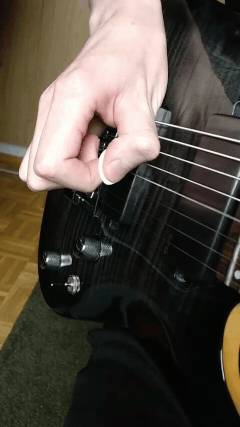Heya, here’s something I learned and wanted to share. Hope someone can benefit from this in some way!
When I joined CTC, one of the first bad habits I was able to get rid of was this extreme thumb-wrapping and wrist extension that I used to do for single long notes:

I had no idea I was doing this crutch and obviously couldn’t play very reliably. Thinking back, it’s a bit funny how extremely janky it was. But I suppose the important thing is to realize how and why it first formed. It has something to do with picking mechanics as well as emotional aspects. This is my current understanding:
This motion began happening to me as a learned reflex. After picking a note normally, I would sometimes accidentally hit the same string with the side of my thumb and make a pinch harmonic or just a dead note. I guess I suddenly dug too deep with the pick and/or had too little grip exposure. It could be due to a number of reasons. These happened essentially out of nowhere. Not every time I played a long note, but the more I “had to get it right” the more likely it was to happen.
Anyway, these unwanted pinches and dead notes happened during live gigs too, and it was very embarrassing when it was during a solo or a very highlighted lead line. Like @hichembell mentioned in his introduction thread, it was something I probably picked up when jamming or playing in a band context (when you have to be heard over a lot of noise, you instinctively pick harder and then accent too hard, dig too deep into the strings, make a pinch or dead note or some other mistake). I was in music school at that time, so being evaluated by teachers and players better than me had its effect as well.
When it happened again and again over time, I learned to avoid the sloppy-sounding pinch harmonic at all costs. It could be that my body’s way of adapting to the sensation of embarrassment was to learn to not hit the pinch harmonic in the first place. So without realizing it, I began replacing my deep-digging accented pickstrokes with this thumb-wrapping and wrist extension you can see in the GIF. Whenever I did that, the result was happier: no pinch, no mistake, no embarrassing feelings or imaginary glares from the audience. But it was inefficient, slow, unreliable and worst of all, I wasn’t aware of it.
There was a time when the crutch was so bad that I messed up a guitar intro melody, live on stage, by missing the first note completely. I waited for the 1-2-3-4 count-in, and then just whiffed right past the string altogether. I was too afraid of making sloppy-sounding string contact, so I relied on the crutch and it backfired in the worst possible way. It wasn’t stage fright, I wasn’t nervous at all. I was as ready as can be, but that still happened. Again, the more I had to get it right, the more likely I was to use a crutch.
I think that subconscious fear of bad notes was preventing me from even trying to play notes in a reliable manner. Thankfully, after learning more and discovering CTC and the ideas of escape motions, angles of attack and so on, it was pretty easy to get rid of this crutch. It’s pretty much completely gone now.
However, dialing it in did require a certain mindset. I had to learn to let go of micromanagement and of “being afraid of making bad sounds”, or else the crutch took over again. Skipping the problem with a crutch had to be replaced with a motion that just actually makes sense. Eventually, when I got to experience that making a new motion produces a great sound and feels easier too, the crutch disappeared.
I think it’s natural for a musician to be guided by the resulting sound that he or she hears after producing a note, but in this context, I had to focus on the motion first and sound second.
(Bonus: Thanks to this adventure, I can now do pretty good pinch harmonics at will, instead of at luck!)
